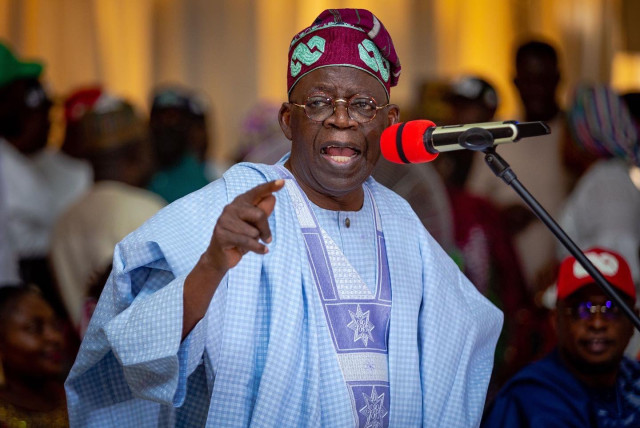President Bola Tinubu called for empowering regional blocs to establish well-funded standby military forces to contain military adventurers, terrorism, and religious extremism.
In his keynote address at the Summit on the State of Democracy in Africa in Abuja, Tinubu called for the strengthening of regional economic communities to promote integration and trade among African countries, ultimately deepening democracy and accelerating development across the continent.
He emphasized that Nigeria had learned from past experiences that the key to addressing poor democratic governance was through the establishment of more democracies.
Former President Olusegun Obasanjo also expressed the need to re-evaluate the model of democracy inherited from colonial powers as a solution to the challenges facing democracy in Africa.
Tinubu further advocated for the revitalization of sub-regional blocs such as ECOWAS, EAC, and SADC to facilitate robust intra-African commerce, economic growth, and job creation.
He stressed that the full potential of AfCFTA could only be realized through concrete economic integration and collaboration at the sub-regional levels, as represented by Vice President Kashim Shettima.
He stated that it is necessary to carefully consider ways in which African sub-regional organizations can contribute to improving intra-African trade, attaining food and energy security, increasing youth employment rates, reducing poverty, and achieving greater prosperity for the people.
The president emphasized the importance of revitalized sub-regional cooperation in effectively implementing the groundbreaking AfCFTA by standardizing rules and regulations to facilitate the free flow of goods, services, and people.
While acknowledging concerns about recent military coups leading to democratic setbacks, he expressed optimism about successful elections in countries such as Liberia, Kenya, Ghana, and Nigeria.
He also expressed concern about the reversal of democratic governments, particularly in West Africa, due to recent military coups in Mali, Guinea Conakry, Burkina Faso, Niger Republic, and Gabon.
Tinubu called for discussions on empowering regional blocs to establish well-funded standby military forces to counter military interventions and the rise of terrorism and religious extremism.
He urged African leaders to uphold constitutional principles such as term limits, ensure credible elections, and establish independent institutions through the African Peer Review Mechanism (APRM) to strengthen democratic consolidation.
The focus of this summit should be on discussing how the APRM can contribute to promoting good governance and democratic consolidation in Africa," he emphasized.
He also stressed the need for concrete measures, such as strengthening regional bodies, to improve trade, security, and constitutional democracy for the continent's development and prosperity.
Former President Obasanjo, in his keynote speech, suggested that the key to addressing the challenges facing democracy in Africa lies in re-evaluating the democratic models inherited from colonial powers.
He urged leaders to collaborate in creating a contextual democracy that considers past experiences, addresses current challenges, and prioritizes strong leadership, robust institutions, and a thriving middle class, all rooted in Africa's diverse cultural heritage.
Expressing concern about the growing disillusionment with democracy in Africa, the former president emphasized the importance of a model that aligns with the continent's predominant political system and serves the interests of its people.
In a goodwill message, Dr. Amina Mohammed, the United Nations Deputy Secretary-General and Chair of the Sustainable Development Goals (SDGs), highlighted the significance of women and young people's active participation in politics and decision-making processes as a means to strengthen democracy in Africa.
She highlighted the need for authorities in Africa to effectively enforce laws, uphold accountability, and invest more in democratic institutions, emphasizing their crucial role in sustaining democracy on the continent and beyond.
Similarly, Abubakar Mahmoud (SAN), former President of the Nigerian Bar Association (NBA) and a member of the Board of Directors of the Shehu Musa Yar’adua Foundation, mentioned that the summit's focus on "the state of democracy in Africa" was in line with the foundation's mission and vision.
Mahmoud stated that summit participants were expected to thoroughly examine the current model of democracy in Africa and address the challenges faced in order to reshape democracy on the continent.
In a related development, the ECOWAS parliament's sixth session in Kano, North-west Nigeria, saw the adoption of important parliamentary instruments to guide its mandate's progress and implementation.
These instruments included the rules of procedure, the strategic plan, and the 2024 work plan of the parliament.
Acting Speaker of the ECOWAS parliament and Deputy President of the Nigerian Senate, Senator Barau Jibrin, emphasized the significance of these protocols in facilitating the parliament's work during his opening speech at the session.
Jibrin emphasized the significance of the extraordinary session, highlighting the need to deliberate and adopt three essential instruments crucial to the effective implementation of their mandate.
These instruments include the rules of procedure of the sixth legislature, the strategic plan of the sixth legislature, and the 2024 annual work plan.
Jibrin stressed the importance of the rules of procedure in enhancing efficiency and providing guidance to prevent procedural deficiencies.
He also emphasized the strategic plan's role in aligning programs and activities with ECOWAS' institutional objectives, while the work plan will set the agenda for their engagements in the coming year.
Jibrin concluded by stating that the adoption of these instruments marked the commencement of parliamentary activities by the community parliament.




















